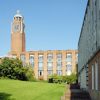
University staff stage second strike
University of Exeter staff are taking part in a second day of national strikes over pay conditions today (3 December).
Members of the UCU, Unite and UNISON unions are holding a second day of strikes having already taken industrial action on October 31.
Members of the EIS union, which represents Scottish university staff, are also join today’s strikes not having taken part of the previous strike.
Unions are striking over a 1% returned pay offer from University employers which the unions argue actually represent a 13% pay cut due to the rising cost of living.
The Univesities and Colleges Employers Association (UCEA) has maintained that the 1% pay offer is “sustainable, fair and final”
A UCEA spokesperson said: “The overwhelming majority of staff realise that the unions’ continuing demands for higher pay increases are neither affordable nor sustainable and they have no wish to cause any disruption to their institutions, and especially their students.
“Pushing pay costs even higher than the 3% already committed would simply put jobs at risk and nobody wants that. If the second day of strike action goes ahead, institutions will do their very best to protect students.”
UNISON General Secretary Dave Prentis, speaking at the previous strike said: "Today's action shows that universities rely on the dedication, flexibility and goodwill of our members.
"We are sending a clear message to cash-rich but morally bankrupt employers that they must stop behaving like the worst private sector employers.
"Our members in higher education deserve a better standard of living for their hard work and the contribution they make to the success of UK universities."
Some students have come out in support of the university staff in calling for better pay conditions due to likening the news to
In a statement on today’s strike the Exeter Occupiers wrote: “The truth is that the people cutting staff wages are the same people privatising our student loans. Students and staff alike must unite against cuts that affect us all.
“Many realise the detrimental effects these cuts and other issues will have on our education and in general at a time when the cost of higher education is so great.
“However, as students we are consistently under-represented by those who claim to represent us in the NUS. This is why students across the country are organising as one and taking direct action to fight against cuts and fees.
“It is clear that the interests of university leadership are utterly opposed to the interests of those who make up our universities – that is, us, the staff and students. “
However other students have raised concerns over the use of striking whn so many students are dissatisfied with limited contact hours.
A study into student perceptions by the Quality Assurance Agency for Higher Education (QAA) found that some students have as little as two hours of lectures a week, which seems to be incredibly poor value for money, particularly with the recent rise in tuition fees.
The QAA study found dissatisfaction to be highest among those studying Arts and Social Sciences, with one joint Arts student remarking that “£3,000 is a huge amount of money to spend on four hours a week contact time”, let alone the new fees of £9,000.
A politics student quoted in the report highlights the unfairness of the situation, asking “why does my course cost the same as chemistry or medicine, when I use no resources, except the libraries and have only six hours contact time per week?”














